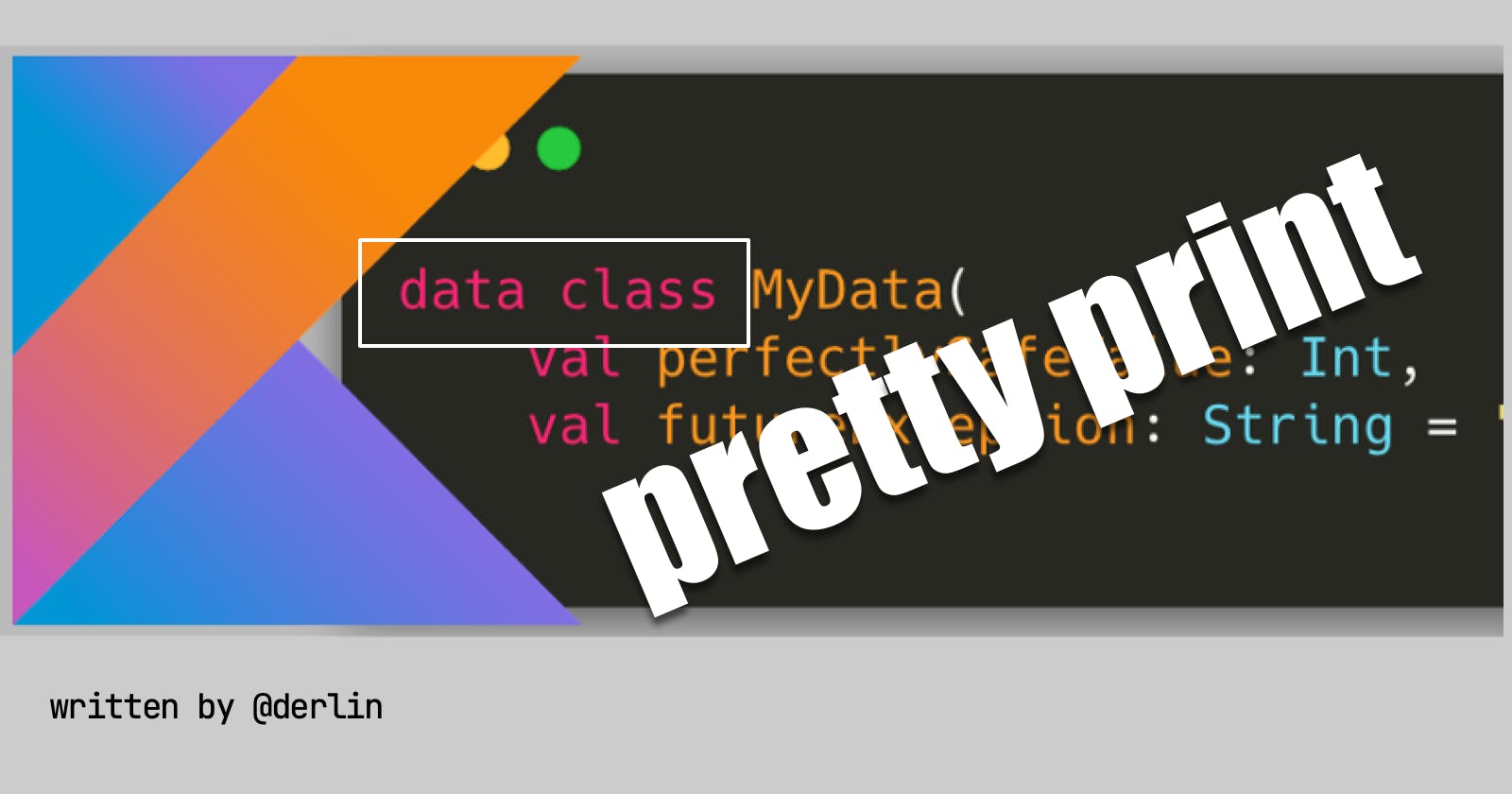Working on a little new library to fetch book metadata from GoodReads, I stumbled upon a basic, yet tricky need/problem: pretty-printing data classes in Kotlin.
NOTE: I am not the only one wishing this feature to be available ↦ discuss.kotlinlang.org/t/pretty-print-data-..
What I wanted
Kotlin data classes have many advantages, one of which being the automatic override of toString in an already nice format. For example, given a simple data class:
data class Person(
val name: String,
val dateOfBirth: LocalDate,
val married: Boolean = false,
val children: List<String> = listOf(),
val n: Int? = null
)
the output of toString() would be for example:
Person(name=Dani Chou, dateOfBirth=1988-06-13, married=false, children=[Max, Leo, Soan], n=1)
However, to make it more readable (especially when the data class has more properties), I wanted something like:
Person(
name="Dani Chou",
dateOfBirth="1988-06-13",
married=false,
children=["Max", "Leo", "Sam"],
)
The requirements were, in order of importance:
have each property on a new line (preferably with indent),
have strings quoted,
nice-to-have keep the data class property definition order,
nice-to-have have compilable text, that can be copy-pasted as is in a kotlin file.
Solutions found online (not retained)
From the different threads and searches, three solutions usually popped up: regexes, JSON serialization, and the pretty-print - pp library.
Use regexes
The first basic answer is usually to use some replace on the toString output. The easiest I could do was:
fun Any.toPrettyString(indentSize: Int = 2) = " ".repeat(indentSize).let { indent ->
toString()
.replace(", ", ",\n$indent")
.replace("(", "(\n$indent")
.dropLast(1) + "\n)"
}
It works quite well when we have empty children:
Person(
name=Dani Chou,
dateOfBirth=1988-06-13,
married=false,
children=[],
n=1
)
But fails miserably once we have non-empty lists, or if any property contains , and/or parentheses (for example name="Dani, Chou (nickname)").
I tried other regex-based approaches, but there is always a catch: what if a string contains prop=value, or other characters matching perfectly our patterns?
JSON serialization
Another possibility is to actually serialize the data class into JSON (or another format). The output would be:
{
"name": "Dani Chou",
"dateOfBirth": {
"year": 1988,
"month": 6,
"day": 13
},
"married": false,
"children": [
"Max",
"Leo",
"Soan"
],
"n": 1
}
This output is nice, but only satisfies requirements 1-2. Moreover, it has some downsides:
the name of the data class is missing,
depending on the library used, the order of properties in the output will vary,
we are far from the original
toStringoutput,lists are pretty printed as well (which is not bad per se, but didn't match my tastes on my specific use case).
Moreover, this requires more setup and dependencies, even though my project doesn't need JSON at all.
Lots of libraries are available for JSON serialization, including jackson and gson (both very straightforward).
I ended up trying kotlinx.serialization, as it is maintained by the core kotlin team. And gosh, this was hard. After finally understanding how to configure it properly, I annotated my data class with @Serializable and got a beautiful exception. The problem? There is no built-in support for LocalDate...
For posterity, here is the serializer I had to implement:
object LocalDateSerializer : KSerializer<LocalDate> {
override val descriptor: SerialDescriptor = PrimitiveSerialDescriptor("LocalDate", PrimitiveKind.STRING)
override fun serialize(encoder: Encoder, value: LocalDate) = encoder.encodeString(value.toString())
override fun deserialize(decoder: Decoder): LocalDate = LocalDate.parse(decoder.decodeString())
}
The dateOfBirth would also need to be annotated with the following to work:
@Serializable(with = LocalDateSerializer::class)
Note also that contrary to GSON (used in the example above), kotlinx won't preserve the data class properties order.
pretty print - pp library
This post on Reddit made me aware of a library that seems to provide exactly what I need: github.com/snowe2010/pretty-print. It is very lightweight and depends solely on kotlin-reflect.
However, this didn't work for me, primarily because of LocalDate. Using pp():
Person(
name = "Dani Chou"
dateOfBirth = LocalDate(
MIN = LocalDate.<static cyclic class reference>
MAX = LocalDate.<static cyclic class reference>
EPOCH = LocalDate.<static cyclic class reference>
serialVersionUID = 2942565459149668126
DAYS_PER_CYCLE = 146097
DAYS_0000_TO_1970 = 719528
year = 1988
month = 6
day = 13
)
married = false
children = [
"Max",
"Leo",
"Soan"
]
n = 1
)
I also didn't like the way lists were shown, with one item per line and a big indent.
My solution
I ended up writing my own little helpers. Those are not for general use, and only cover my needs:
simple data classes (no nesting),
only basic types except
LocalDate,support for lists only (with the same basic types support).
It depends solely on kotlin.reflect, which needs to be imported explicitly in the project.
The result is a perfectly valid kotlin code:
Person(
name="Dani Chou",
dateOfBirth=LocalDate.parse("1988-06-13"),
married=false,
children=listOf("Max", "Leo", "Soan"),
n=1,
)
Here is the code, which is easily extensible to other types:
import java.time.LocalDate
import kotlin.reflect.KClass
import kotlin.reflect.full.declaredMemberProperties
@Suppress("UNCHECKED_CAST")
internal fun <T : Any> ppDataClass(data: T, indent: Int = 2): String {
val klass = data::class as KClass<T>
// store all declared properties in a map as key=value
val propsInObject = klass.declaredMemberProperties
.associate { it.name to it.get(data) }
// extract the properties present in toString(), preserving order
val orderedPropsInToString = "([A-Za-z0-9_]+)=".toRegex()
.findAll(data.toString()).map { it.groupValues[1] }
return with(StringBuilder()) {
val spaces = " ".repeat(indent) // indent
// start with ClassName(
appendLine(klass.simpleName + "(")
// all toString properties (ordered) and their formatted values
orderedPropsInToString.forEach { propName ->
val value = ppValue(propsInObject[propName])
appendLine("""$spaces$propName=$value,""")
}
appendLine(")") // close the class name
toString()
}
}
private fun ppValue(value: Any?): String {
if (value == null) return "null"
return when (value) {
is String -> "\"$value\""
is LocalDate -> "LocalDate.parse(\"$value\")"
is List<*> -> "listOf(" + value.joinToString(", ") { ppValue(it) } + ")"
else -> "$value"
}
}
The only little trick worth mentioning is that I first call toString() on the data class, and extract all properties present in the output. The goal is two-fold:
this allows me to preserve the data class properties declaration order, whereas
kotlin.reflectreturns properties in alphabetical order,this allows for a data class to omit some properties, by changing the
toStringmethod.
In GoodReads Metadata Fetcher, all my data classes offer a toCompilableString method, which internally calls the ppDataClass above.
Conclusion
This simple problem got me on an interesting journey that I wanted to share. Even though pretty-printing data classes may seem basic, there is currently no tool perfectly tailored for the task.
It is possible to come up with very nice (though limited) solutions using the power of kotlin.reflect, but as the pretty-print library showed, making those solutions truly generic is very difficult, and will always miss some edge cases (e.g. LocalDate).
Written with ❤ by derlin

